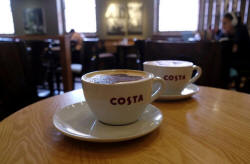Coca-Cola takes plunge into coffee with $5.1 billion
Costa deal
 Send a link to a friend
Send a link to a friend

[August 31, 2018]
By Kate Holton and Martinne Geller
(Reuters) - Coca-Cola Co <KO.N> has agreed
to buy coffee chain Costa for $5.1 billion to extend its push into
healthier drinks and take on the likes of Starbucks and Nestle in the
booming global coffee market.
The purchase from Britain's Whitbread <WTB.L> of Costa's almost 4,000
outlets thrusts the world's biggest soda company into one of the few
bright spots in the sluggish packaged food and drinks sector.
Paying about 1 billion pounds ($1.3 billion) more than some analysts had
expected, Coke will use its distribution network to supercharge Costa's
expansion as it chases current coffee chain market leader Starbucks <SBUX.O>
and its almost 29,000 stores across 77 markets.
Beyond coffee shops, Coca-Cola CEO James Quincey, himself a Briton
familiar with the UK brand, said Costa would provide an important growth
platform ranging from beans to bottled drinks in what is one of the
world's fastest-growing drink categories, growing around 6 percent a
year. Coke sells Georgia coffee in Japan, but wanted a bigger platform.

"Coca-Cola doesn't have a broad, global portfolio in this growing
category," Quincey said in a blog post https://www.coca-colacompany.com/stories/james-quincey-on-costa,
highlighting Costa's retail footprint, roastery, supply chain and Costa
Express vending system, which the company plans to expand.
But Coca-Cola will face a fight, as rivals are also bulking up in a
fragmented market, keen to attract young people prepared to pay out for
barista-made drinks and developing tastes for ever more exotic coffees.
Nestle <NESN.S>, the market leader in packaged coffee, for example, has
sealed a $7 billion licensing deal for Starbucks' retail business, while
Europe's billionaire Reimann clan has built the JAB empire spanning
coffee brands such as Kenco, Douwe Egberts and soft-drink maker Dr
Pepper Snapple.
Operating a retail chain marks a new challenge for 132-year-old
Atlanta-based Coca-Cola, which mostly sells soft drink concentrates to a
network of franchised bottlers.
Other packaged goods firms with restaurant footprints include Nestle,
with its stake in upscale coffee chain Blue Bottle, and Unilever <UNc.AS>
with gelato chain Grom.
In the key U.S. market, an expansion of Costa shops into the country
would be a threat for Starbucks, McDonalds <MCD.N> and JAB, which owns a
string of chains including Peet's and Caribou.
Meanwhile, a roll-out of canned or bottled coffee drinks through Coke's
bottling system could upset the dominance of a joint venture between
Starbucks and PepsiCo <PEP.O>.
The purchase of the biggest coffee chain behind Starbucks adds to
Coca-Cola's drive to diversify away from fizzy drinks and expand its
options for increasingly health-conscious consumers, after countries
started introducing sugar taxes.
CAFFEINE HIGH
Whitbread shares leapt as much as 19 percent to a 2-1/2 year high of 48
pounds on news of the deal, which analysts said was priced at a punchy
16.4 times Costa's latest annual earnings. Coke shares were up more than
1 percent in pre-market trading.
"Coca-Cola are one of the few companies in the world that could justify
the valuation," said Nicholas Hyett, equity analyst at Hargreaves
Lansdown.
[to top of second column] |

Cappuccinos sit on a table in Costa Coffee in Loughborough, Britain
April 25, 2018. REUTERS/Darren Staples

"Its global reach should turbo-charge growth in the years to come, and hot
drinks are one of the few areas of the wider beverages sector where the soft
drinks giant doesn’t have a killer brand. Costa will get lots of care and
attention."
Whitbread had been in the process of demerging Costa from its hotel group
Premier Inn, and the sale marks the latest transformation in a business that was
established in 1742 as a brewer and which has also owned sports clubs and
restaurants.
Whitbread bought Costa, founded in 1971 in London by Italian brothers Sergio and
Bruno Costa, for 19 million pounds. It only had 39 shops then, but now its
maroon shop front is one of the most ubiquitous sights on British high streets,
with 2,422 outlets in the UK and a further 1,399 in international markets,
operated as franchises, joint ventures and wholesale outlets.
Whitbread Chief Executive Alison Brittain said the price tag represented "a
substantial premium" to what would have been created through a demerger.
"We were not interested in a sale other than to somebody who had a strategic
rationale and therefore would be able to create significantly more value than
Costa could create on its own."
Some of the proceeds will go toward reducing Whitbread's pension deficit and
financial debt to ease expansion of the Premier Inn hotel chain in the UK and
Germany, but Brittain said a "significant majority" of the cash would go to
shareholders.
Brittain also denied Whitbread had been pressured to accelerate the sale by
activist investor Elliott and other hedge funds. "I would imagine they would be
as delighted and surprised as anybody else this morning," she told reporters.

CAFE CULTURE
The global market for packaged coffee and drinks was worth about $83 billion in
2017, a fraction of the $513 billion market for soft drinks, according to
Euromonitor International, but it is growing faster. What is more, sales at
coffee shops like Starbucks and Costa are growing even faster, as people
increasingly indulge their habit on the go, rather than at home.
Costa recently expanded into China to try to offset an increasingly saturated
market in Britain, where chains such as Starbucks and Caffe Nero vie with
thousands of independents.
A burgeoning cafe culture in China provides an encouraging backdrop, but Costa
faces intensifying competition there as well. Starbucks, which has 3,400 stores
in China, is planning to almost double that by 2022, while partnering with
Chinese tech giant Alibaba <BABA.N> to start delivery services.
Local rival Luckin is also planning to more than double its Chinese store count
to 2,000 by the end of 2018.
Rothschild advised Coke on the deal while Goldman Sachs, Morgan Stanley and
Deutsche Bank advised Whitbread.
($1 = 0.7679 pounds)
(Additional reporting by Sangameswaran S and Shashwat Awasthi in Bengaluru, Ben
Martin in London and Miyoung Kim in Seoul; Editing Mark Potter)
[© 2018 Thomson Reuters. All rights
reserved.] Copyright 2018 Reuters. All rights reserved. This material may not be published,
broadcast, rewritten or redistributed.
Thompson Reuters is solely responsible for this content. |